2019 was a memorable year indeed. Through the many distractions, most Americans are still reaping the benefits of the Republican tax cuts, record-low unemployment and a booming economy. I look forward to 2020, during which I will continue to make your voice heard in Washington.
January
I had the pleasure of welcoming my family to Washington D.C. for the 116th Congressional swearing-in ceremony. I always love having my family visit D.C. to spend some time with me in the office and take in the wonders of our nation's beautiful capital!
By the way, that was the first photo taken in my new Washington, D.C. office- 1427 Longworth House Office Building.
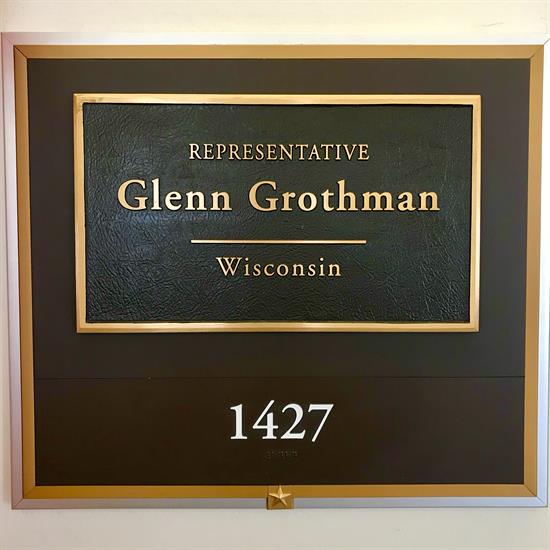 |
My staff and I wasted no time before introducing five bills. The first is The People’s Border Wall Fund Act, which would allow the American people to actively take part in making America safer by allowing them to personally contribute to the construction of a wall on the Southern border. The second would make Fond du Lac native James “Maggie” Megellas eligible to receive the Medal of Honor. Maggie's story is truly amazing and I believe he is an American hero deserving of this award for service to our country. For the third, I authored, with Congressman Pocan (D-Madison), a bill that will help save Wisconsin's environment from invasive fish species.
The fourth bill I introduced is the bipartisan End Government Shutdowns Act. Under this act, if Congress fails to fund the government, an automatic continuing resolution (CR) will be activated that will fund the government at the previous year’s levels, preventing all future shutdowns. This bill will not only instill economic stability and promote a more purposeful budgetary process, but it will also provide peace of mind to federal employees throughout the United States. The state government of Wisconsin has had this in place since 1953. As a state legislator, I participated in budget negotiations firsthand and under these rules, the state budget always gets completed and we have never had a shutdown. This legislation will bring a bipartisan approach to the funding process and will help eliminate shutdowns for good.
The last would promote immigrant self-sufficiency by requiring an individual to be a U.S. citizen in order to receive federal benefits, such as Medicare, Medicaid and SNAP.
Also in January, I made my first trip to survey our Southern border. This time, I went to Arizona, where I took this picture of the border wall.
February
I introduced the Student and Teacher Safety Act. This bill will allow schools more flexibility with existing federal funds to make physical safety improvements to campus facilities, support local education programs aimed at improving school safety and security and assist in coordination between schools and local law enforcement to identify threats. I believe no student or teacher should ever feel unsafe in a school setting. While this bill is a good step toward increasing safety in our school system, there is still work to be done to help prepare schools to properly identify and respond to violent individuals.
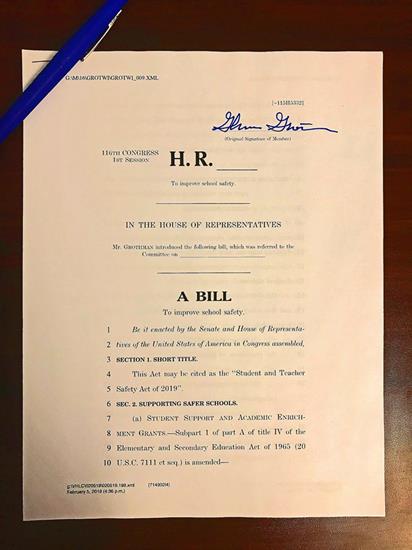 |
With continuous growth in the fourth quarter of 2018, we received word in February that the U.S. economy grew by 3.1 percent in 2018. This marks the highest rate of economic growth since 2005. Thanks to the Tax Cuts and Jobs Act and a strong job market, the unemployment rate hit record lows, wages increased and consumer spending remained high. The fourth quarter also saw an increase in business investment nationwide, indicating the sustainable and continuous growth we see today.
March
House Democrat leadership, led by Speaker Nancy Pelosi, kicked off March by passing H.R. 1 on the House floor. For some background, in each Congress, H.R. 1 is reserved for the bill that is the majority party's top goal. In the last Congress, Republicans' top goal was to give sweeping tax cuts to millions of middle-class families around the country in order to allow them keep more of their hard-earned money and help the economy grow. H.R. 1, which passed on March 6, 2019, is nothing more than a federal government takeover of elections, usurping states' rights to administer their own free and fair elections. Here are some of its provisions:
- This bill creates a 6:1 federal match on donations $200 or less. This means that if an individual makes a $200 donation to a candidate's campaign, the federal government will also send that campaign $1,200 of taxpayer money to be used for things like negative TV advertisements, bulky campaign mailers and even travel reimbursements for the candidate.
- It also creates a federal voucher system that allots each voter $25 to give to the candidate of their choice. This amounts to $6.3 billion dollars.
- The Federal Election Commission (FEC) currently consists of a bipartisan commission that holds candidates accountable to election laws. H.R. 1 would remove this requirement and make the commission into a partisan weapon.
- This bill will make election fraud even easier, as it allows individuals to register to vote with little to no verification that they are a resident of that jurisdiction.
On March 20, 1854, this little school house in Ripon, WI became the birthplace of the Republican party. That is why I was excited to visit on the GOP's 165th birthday. It is a privilege to represent Wisconsin's Sixth District, home of the Republican party. The GOP was founded on the idea of individual liberty and the notion that each citizen, not the federal government, knows how best to care for him or herself. I use these ideals in Washington when making decisions because I believe that restoring power to the states and individuals is how our country will truly thrive!
Some Washington politicians briefly floated the idea of cutting federal funding for the Special Olympics. That's why I sent this letter to the House Appropriations Committee supporting the full funding of the Special Olympics. I wholeheartedly support these athletes and hope my colleagues will continue to do the same.
Something that is vitally important to America, and particularly Wisconsin's Sixth District because of all of the skilled labor jobs we have, is revitalizing career and technical education for young people, and that includes apprenticeships. At a House Education and Labor Committee hearing, I spoke with experts about the skilled labor shortage and the benefits of encouraging high school students to pursue careers in the skilled labor market. Often, students are misinformed and encouraged to get a traditional four-year degree, when pursuing a trade will enable them to acquire a high-paying job without a mountain of debt.
I far too often see young people who are 28 or 29 and sometimes 33 or 34 years old who enroll in technical school or take on apprenticeships because they have either given up trying to find a job with their four-year degree or they have lost interest in that subject. The worst part about that situation is that they likely have student debt, and they have missed out on a decade of working in a potentially high-paying skilled labor job. One of the best things we can do for the future of our country is to destigmatize career and technical education for kids graduating high school.
April
I signed on as a cosponsor of the bipartisan Born-Alive Abortion Survivors Protection Act, H.R. 962. I have always been an ardent defender of pro-life policies and I believe it is imperative that H.R. 962 be brought to the House Floor for a vote immediately to protect babies that survive abortions.
Since the start of 2017, Republicans have passed legislation that cuts red tape, unleashes the power of the free market and puts more money into the pockets of the American worker. The April, 2019, jobs report was further proof that Republican policies benefit everyone as the numbers once again beat expectations! We have added 263,000 new jobs, cut unemployment to lows not seen since we first landed on the moon and beat GDP growth expectations.
May
The month of May started out with some great news. I have been pushing for the expansion of Highway 23 between Fond du Lac and Sheboygan for years. I am glad that we finally broke ground on this important project that is long overdue and will save lives! The highway will be expanded into four lanes and is projected to be finished in 2022. The House was in session during the groundbreaking ceremony, so while I was working in Washington, my District Director, Alan, was there to represent the Sixth District.
On May 14, the House unanimously passed H.R. 299, the Blue Water Navy Vietnam Veterans Act. Since I started serving in Congress, many veterans groups have come to my office to discuss the importance of this bill, so I am glad that the House passed it with unanimous bipartisan support, and has since been signed into law by President Trump.
During the Vietnam War, many U.S. soldiers were exposed to the chemical herbicide called Agent Orange, which can have detrimental health effects. Under current U.S. law, any Vietnam veterans have the ability to apply for additional benefits related to Agent Orange exposure if they served on the ground or intercoastal waterways (one mile or less from shore). However, many service members in the surrounding areas who did not set foot in Vietnam were exposed to Agent Orange from contact with clothes, gear, food or water that had been contaminated. The Blue Water Navy Vietnam Veterans Act will extend benefits to the veterans who served in the South Pacific, but did not necessarily set foot in Vietnam. These men and women are experiencing the same effects as many soldiers who were on the ground, and I believe they deserve the same respect.
Earlier this year, I spoke with a young man and his father in Wisconsin. The young man was in his early-mid 30s and severely physically disabled. But, he was a very sharp guy. For years, he was employed at a work center, which is equipped to employ workers with disabilities. The young man I spoke with told me that he loved going into work and earning a paycheck. Recently, however, he was forced out of his job and though he was in good spirits when I spoke with him, his father told me that he was crushed when he lost his job. I have toured nearly every work center in Wisconsin's Sixth District and this story is not unique. I am a proponent of keeping work centers intact because they allow more people to live fulfilling lives and achieve the dignity that comes with employment and earning a paycheck.
At a House Education and Labor Committee hearing, I asked experts about how recent attacks on work centers have put employment choice and opportunity for workers with disabilities at risk. Testimony from one of the witnesses, Mr. Shayne Roos, demonstrates how these actions lead to significant job loss for people with disabilities.
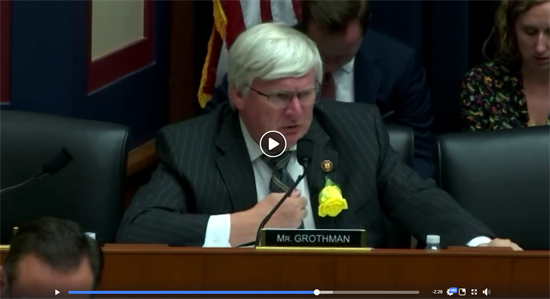 |
During the last days of May, I went down to our southern border for the second time this year with my colleagues to observe the situation at the border and speak with border patrol agents about their day-to-day work. This time, we went to Texas. The border agents told me point blank- there is a humanitarian crisis at our southern border.
In McAllen, TX, agents briefed us on the drug trade coming in from the Mexican state of Tamaulipas, which currently has a level 4 travel advisory (do not travel) from the U.S. State Department, the same level as Iraq and Afghanistan. Five cartels are currently fighting for control of the Rio Grande Valley, and our border agents receive far too little help from Mexico to make the area safer.
In Laredo, TX, we visited the Rio Grande, which, at some points, 100 yards of knee-deep water is all that separates Mexico from the United states. The agents told us that if all of the technology and manpower under their control were performing at 100 percent capacity, then that would still only amount to 30 percent of the border being covered. This shows that there is, in addition to outdated technology, a serious lack of equipment for our agents. Simply put, our border patrol agents are smart, hard-working compassionate people who are currently trying to make the best of a bad situation.
I took what I learned back to Washington, D.C. to aid in the fight to build the wall, give our border patrol agents the resources they need and secure our border. We desperately need to fulfill all of these objectives in order to protect not only American citizens, but the Mexican, Central American and South American citizens who are being used and abused by the cartels.
June
One of my most important duties as your representative in Congress is to protect servicemembers that have given so much for our freedom. That includes Wisconsin's veterans who are in need of quality health care. The VA MISSION Act, passed by the Republican-led House last Congress and signed into law by President Trump, took effect on Thursday, June 6, 2019. This new law is intended to improve the VA and deliver better care to veterans across the country. I will always fight to improve the lives of active duty military personnel and veterans. Because, without them, we wouldn't be able to enjoy all of the freedoms this country has to offer. Thank you all for your service!
Please click this link to read a short summary of the VA MISSION Act provided by the Senate Committee on Veteran's Affairs.
Early in June, we learned that in the month of May, just one month, there were over 144,000 apprehensions at our Southern border, which turned out to be the high point for the year. During my trip to the border in Texas, border patrol agents showed us the facilities where people illegally crossing the border are processed. I asked one of the agents how long it took to process one person, and she told me it took about one hour. This means that agents spent 144,000 hours processing illegal immigrants last month. One of the the things I didn't realize, but makes sense, is that since the drug cartels control the border, almost no one gets across without their help. The cartels charge up to $5,000 to help a child across the border and up to $10,000 for an adult. This has resulted in an estimated $2.3 billion in revenues to the cartels. What's even worse is how these people are being treated. In order to minimize costs, cartels often hide people in over-crowded, run-down stash houses with only one "meal" of lunch meat per day.
Many of my colleagues have not seen the border firsthand. The real story of what is happening at the border needs to be told. That is why I took to the House Floor this month to talk about just how dire this crisis has become.
On June 21, I introduced H.R. 3422, the Competency-based Education Act. This bill provides the framework needed for universities to more easily and effectively provide competency-based education (CBE) programs to students. I am proud to say that my fellow Wisconsin Congressmen, Rep. Mike Gallagher (WI-08) and Rep. Bryan Steil (WI-01), have signed on as cosponsors of this bill.
A major concern in America is the amount of student loan debt students acquire when seeking a traditional four-year college degree. In Wisconsin, the average student graduates with nearly $30,000 of debt. CBE alleviates this by allowing students to learn at their own pace and often obtain the same degree in a much shorter amount to time. The University of Wisconsin is a leader in CBE and has seen the program save students thousands of dollars, allow for flexible school schedules and deliver the same quality of results as traditional time-based education programs. Two of their most popular programs are in health care and information technology (IT).
Making sure our students receive the best education possible to prepare them as future leaders of the country has long been one of my top priorities. Equally as important is giving students educational options that do not leave them with a mountain of debt.
To read more, please click here. I also joined local radio host Vicki McKenna to talk about this bill. Click here to listen!
Congratulations to Emma, the winner of this year’s Congressional Art Competition from Wisconsin's Sixth District. Her work, “Beauty”, currently hangs in the U.S. Capitol.
During my trip to our Southern border, it was clear that a key component in this dire situation at the border is the lack of resources available to our border patrol agents. They are underfunded, understaffed and overwhelmed. I am happy to say that on June 27, Congress finally buckled down and did its job by passing a bipartisan emergency funding bill for our border patrol and ICE. This long overdue bill will give those protecting us the resources they need to increase surveillance, process illegal crossers more efficiently and make sure unaccompanied minors are given the care they deserve. For more information on the bill, please click here.
July
In July, there was much ado about the Democrats' $15/hour minimum wage bill. There was, however, a certain provision in the bill, intentionally included by its creators, that was particularly offensive to me. This provision would effectively make it impossible for businesses to employ individuals with disabilities. That is why I took to the House Floor to address my colleagues about the devastating effect this would have on individuals with disabilities and their families. Since I have been a longtime defender of the rights for individuals with disabilities, I had letters from many of my constituents who enjoy their job at a work center. One in particular was from my friend, Yael Kerzan. She enjoys her job at Northwoods in Portage because it provides her with something to do, a steady paycheck and, as she says, "it's where all my friends are!".
Here is a photo of Yael and her parents taken at my Fond du Lac office.
August
To kick off August, I took my third trip this year to our Southern border. During each visit, I learn about a new challenge faced by our border patrol agents and how Congress can fix it. The situation at the border is dire and it truly is a crisis. The solutions that border patrol agents give me, however, are clear and could be enacted by Congress immediately. Our agents need better technology, strategically placed wall and faster turnover in our immigration courts so as to not overcrowd the holding facilities.
The supplemental border funding bill passed by Congress earlier this year helped, but that was only a temporary fix. House Democratic leadership has been either unwilling or unable (due to the power of the extreme left-wing of the party) to bring these solutions to a vote on the House floor. To exist, a country needs clearly defined borders and immigration laws that are enforced. We have not been holding up the second part of that bargain.
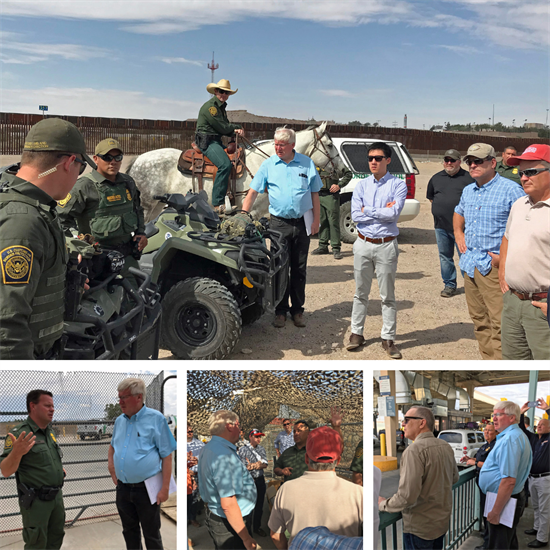 |
One of the priorities of last year's Republican-led Congress was to fight back against the opioid epidemic in our country. The U.S. accounts for 1 in 4 opioid-related deaths worldwide, many of which come from doctor-prescribed pills. That is why it was critical that we passed the SUPPORT for Patients and Communities Act, which was quickly signed into law by President Trump. I am happy to say that in August of this year, it was reported that opioid-related deaths in Wisconsin were down last year for the first time since 2015! Click here to read the full story.
I am also proud to tell you that my bipartisan bill, the Improving the Federal Response to Families Impacted by Substance Use Disorder Act,was incorporated into the SUPPORT for Patients and Communities Act. My bill established a federal taskforce with the mission of coordinating the federal response to the opioid crisis. The taskforce helps to identify, evaluate and recommend best practices to states and local agencies in their fight against opioid abuse. The taskforce also develops ways to better identify and prevent substance abuse in the home and around children and minors. This is a big step in the right direction for our country, but we still have a long way to go in the fight against opioids. I will continue to be a leader in that fight.
Each year, the United States welcomes immigrants from all over the world through naturalization ceremonies. We naturalized 761,901 new citizens in 2018, an increase from 2017, which is just shy of the amount naturalized by the entire European Union. I was honored to witness a naturalization ceremony in Milwaukee. I was happy to speak with our newest U.S. citizens.
September
I had the honor of moderating floor debate on H.R. 2134, the Helen Keller National Center Reauthorization Act. This bill will continue to equip deaf-blind individuals with the tools they need to live, work and thrive in their communities and passed the House with bipartisan support. Watch my opening comments by clicking on the picture below.
On September 20, I introduced H. Res. 573, a bipartisan resolution recognizing the cultural and historical significance of the Hmong New Year. The Hmong New Year is traditionally celebrated at the end of the rice harvest season in Laos and Southeast Asia in late November and early December. In the United States, the Hmong New Year traditions have carried over, occurring from October through December, and have become significant celebrations for Hmong Americans and many others.
Wisconsin is the state with the third highest Hmong population and I am privileged to represent some of Wisconsin’s largest Hmong communities. Each year I attend the New Year celebrations in my district. These celebrations of thanksgiving are an honor to attend – the food, music and dance make these festivals truly special events. I am glad that both sides of the aisle have come together to recognize Hmong Americans’ significant role in our communities and their pursuit of the American Dream.
In 2003, former Wisconsin Congressman Mark Green introduced the Debbie Smith Act. This bill provides additional resources to law enforcement to increase the speed of DNA testing in order to decrease the amount of backlogged rape kits. In 2004, a version of this bill that originated in the Senate passed Congress and became law.
These additional funds, however, were set to expire. That is why I cosponsored H.R. 777, the Debbie Smith Reauthorization Act, and was glad to see it pass the House with overwhelming bipartisan support before being signed into law by President Trump.
This bipartisan legislation will ensure that our law enforcement and forensic scientists will have the resources needed to expedite DNA testing in rape cases.
October
Opportunities Inc. is a Wisconsin company whose mission is to ensure that individuals with disabilities have a place to learn, work and achieve independence. A-Team USA is a national organization that brings individuals with disabilities and their families together in a grassroots effort to create awareness that certain legislation, like the Democrats' $15/hr. minimum wage bill, would hurt individuals with disabilities by forcing them out of their jobs. These organizations sent me a video, made by their members, highlighting my work on this issue. Thank you to Opportunities Inc. and A-Team USA for bringing these important issues to light. I am a proponent of keeping work centers intact because they allow more people, like my friend Yael, who I mentioned in the July section of this newsletter, to live fulfilling lives and achieve the dignity that comes with employment and earning a paycheck.
At the end of October, I was honored to be on a panel discussing the benefits of the United States-Mexico-Canada (USMCA) trade agreement in Pleasant Prairie, Wisconsin before Vice President Mike Pence's speech on the subject. The USMCA is a new trade agreement that will replace the North American Free Trade Agreement (NAFTA). While NAFTA prompted the loss of 700,000 jobs by moving production facilities outside of the United States, the USMCA will encourage greater domestic production by promoting free trade, economic growth and continued cooperation between the United States, Mexico and Canada.
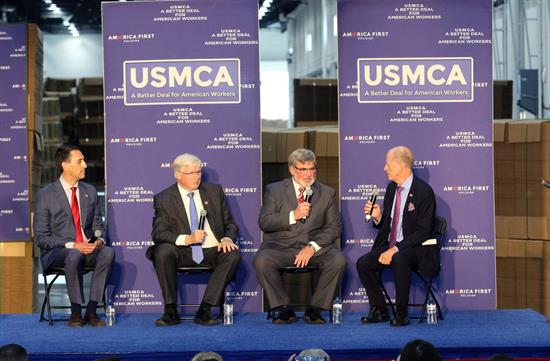 |
Finally, after a year with historically high apprehensions at the border, some good news. The United States Customs and Border Protection (CBP) released the total number of border apprehensions and inadmissibles from September 2019. Thanks to President Donald Trump's leadership and June's deal with Mexico, we have lowered border apprehensions from 144,000 in May to 40,000 in September. This sharp decrease is impressive and truly needed. As I've mentioned before, when we see a decrease in the number of people trying to cross our border illegally, that means less people are being used and abused by the drug cartels in Mexico. While these decreasing numbers are encouraging and I applaud President Trump for his leadership, Congress still has much work to do to further secure our border and protect both Americans and immigrants.
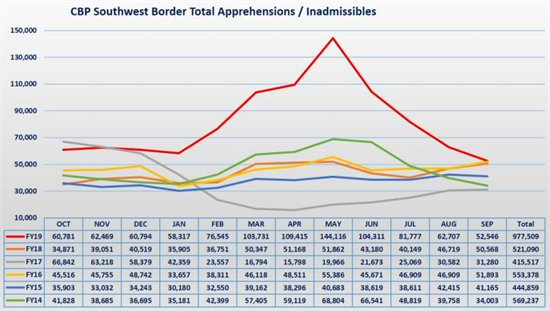 |
November
In November, I, along with Jesús "Chuy" García (D-IL), introduced the bipartisan H.R. 5050, the Veterans and Consumers Fair Credit Act (VCFCA). This bill will curb high-cost, predatory payday loans, auto-title loans and similar forms of toxic credit across America. A bicameral companion bill has been introduced in the Senate by Senators Jeff Merkley (D-OR), Jack Reed (D-RI), Sherrod Brown (D-OH) and Chris Van Hollen (D-MD).
My bill will extend the existing 36 percent interest rate cap on predatory payday loans, auto-title loans and similar forms of toxic credit that covers active duty servicemembers to our nation’s veterans, Gold Star families and all other Americans. With 12 million individuals taking out payday loans in America every year and payday loans carrying an average interest rate of 391 percent, now is the time to act and protect Americans from financial harm. For more information, please click here.
In the picture below, I am speaking with members of the press about my bill. The more light we shed on this subject, the better chance we'll have to put an end to this immoral practice. I am grateful I was able to share VCFCA's impact on multiple occasions, and look forward to continuing the dialogue on this practice that will benefit many Americans.
The week of November 11 was National Apprenticeship Week. One of the greatest challenges America faces is the fact that we have a record-high seven million job vacancies and a growing need for skilled labor. In Wisconsin, I speak with manufacturers often about their struggle to find workers with the right set of skills. This is a problem that, unfortunately, is seen throughout the country.
Fortunately, apprenticeships are a viable solution to train workers for these high-paying, high-demand jobs. The U.S. Department of Labor has reported that 94% of individuals that complete apprenticeship programs not only find jobs, but make an average starting salary of $70,000.
To watch my speech on the House floor on National Apprenticeship Week, please click here or on the picture below.
The following week, I was glad to celebrate National Bible Week. I believe that the Bible is the infallible Word of God that contains truths that are intended to guide our lives and our country. To watch my speech on National Bible Week, please click here or on the picture below.
December
December was a very busy month.
In recent years, the amount of robocalls has spiraled out of control. The Federal Communications Commission (FCC) reported that Americans received an estimated 47.8 billion robocalls in 2018, a 57 percent increase over 2017. And 2019 looks to be even higher. It's unfortunate that innocent Wisconsinites, like yourself, are being burdened by robocalls in increasingly harmful ways, from scams to defraud consumers to disrupting our health care system.
That's why I voted for the TRACED Act on December 4, which will greatly cut down on the number of abusive robocalls. This bill passed the House with a wide bipartisan 417-3 margin and was just recently signed into law by President Trump.
Health care spending per capita has exponentially increased over the past several years, putting a significant strain on the wallets of millions of American families. That's why one of my top priorities is to reduce the cost of health care, while expanding access and putting power back into the hands of patients. In an effort to reduce the price of prescription drugs, numerous bills have circulated throughout Congress this year.
On September 19, 2019, Representative Frank Pallone (D-NJ) introduced H.R. 3, the so-called Lower Drug Costs Now Act. This bill would make America more like a European country when it comes to drug pricing, and it does so at a high cost, with estimates that up to 100 cures would be thwarted due to H.R. 3. That means that this bill could stop us from getting access to new treatments and potential cures for diseases like Alzheimer's, Cancer or Ebola. Another alarming example of dysfunction from European-style markets is the amount of treatments available. Of the active drugs introduced between 2011-2018, 89 percent are available to Americans, compared to 60 percent in the UK and less than half in Canada and France. Under direction from Nancy Pelosi, H.R. 3 passed the House in partisan fashion. Thankfully, it is unlikely that H.R. 3 will pass the Senate and President Trump has indicated that he would veto this harmful legislation.
What we need is a bill that takes bipartisan solutions that will help lower the cost of drugs, while maintaining the American spirit of encouraging innovation. That is why I am an original cosponsor of H.R. 19, the Lower Costs, More Cures Act. This bill contains provisions that have been supported by both Republicans and Democrats, creating a plan that will both make drugs more affordable and help save lives by ensuring we don't lose future cures due to government overreach. If H.R. 19 were to pass the House, it is likely that it would pass the Senate and be signed into law by President Trump.
Myself and other Republicans are trying to enact meaningful, bipartisan reforms that will lower health care costs. Unfortunately for you and your loved ones, Nancy Pelosi chose to move forward with the Democrats' bill that she knows will not be passed in the Senate. So, instead of putting politics aside for the good of the American people, she has chosen to play games with your health and well-being for political gain.
To view my comments on H.R. 3 and H.R. 19 from the House floor, please click here or on the picture below.
After more than a year, hundreds of farmers, manufacturers and trade associations writing in support and countless calls from myself, President Trump and the entire Republican party, Nancy Pelosi finally brought the United States-Mexico-Canada Agreement (USMCA) to the House floor for a vote. It passed with overwhelming bipartisan support by a 385-41 margin.
In November of 2018, President Trump, Canadian Prime Minister Trudeau and former President Nieto of Mexico signed the USMCA at the G20 summit in Argentina. Leaders of each country agree that the USMCA updates the outdated North American Free Trade Agreement (NAFTA) and will be beneficial to workers in all countries, particularly to U.S. agricultural and manufacturing industries.
While NAFTA prompted the loss of 700,000 jobs by moving production facilities outside of the United States, the USMCA will encourage greater domestic production by promoting free trade, economic growth and continued cooperation between the United States, Mexico and Canada. Specifically, Wisconsin's world-famous dairy industry will benefit from the USMCA trade agreement because Wisconsin dairy farmers will be able to export the equivalent of 3.6% of Canada’s dairy market, more than tripling the existing level of approximately 1%. Additionally, there are 231,00 Wisconsin jobs and nearly $11 billion dollars in Wisconsin exports to Canada and Mexico that will be provided a better playing field.
I applaud President Trump for his leadership on the USMCA and am glad that we have a President who is willing to tackle issues that his predecessors, of both parties, refused to address. Along with a booming economy and record-low unemployment, I am happy that we can deliver another win for the American economy and our workers.
On Wednesday, December 18, 2019 the House of Representatives passed two articles of impeachment against President Trump. After many failed attempts, empty accusations and bipartisan opposition in Congress and nationwide, Nancy Pelosi and her party finally completed their three-year crusade to impeach President Trump. Members of Congress began calling for impeachment before the Trump Presidency even began. Three years after he was elected, after millions of jobs created, wages grown, a record-high stock market and record-low unemployment, I am disappointed that my colleagues find it necessary to show their disdain for our President by abusing and politicizing the impeachment process.
While I am disappointed that so many Members of Congress could not see the impropriety of this investigation, I am glad that some did. What is truly astounding is that even more Democrats voted against impeaching the President after hearing the Democrats’ “evidence.” One Democrat even went as far as switching parties after seeing the enthusiastic failure of his former party to conduct themselves with decorum and impartiality. Moreover, I am glad that the Republican party is more united than ever before, as every Republican voted against impeaching President Trump.
In the last impeachment inquiry, President Clinton lied under oath on camera, both parties admitted that he perjured himself, there was a bipartisan vote to open an impeachment inquiry and the independent counsel testified to his findings. During this impeachment inquiry, the transcript of President Trump’s phone call with President Zelensky was released, both parties said that there was no wrongdoing, there was bipartisan opposition to the impeachment inquiry and the independent counsel did not testify.
I was privileged to speak against impeachment and share President Trump's accomplishments on the House floor. To view my floor speech, please click here or on the picture below.
It's been a productive 2019, and I thank you all for your support. It's truly an honor to serve you in Congress. As we enter 2020, I hope that my Democratic friends will begin to put endless impeachment investigations behind them, begin to reach across the aisle and start to take up legislation that will benefit all Americans.
As your Congressman, I’m here to serve you. If you have any questions please don’t hesitate to reach out to my offices in Fond du Lac and Washington. If you enjoyed this newsletter be sure to forward it to your family and friends so they can stay informed on what I’m doing in Washington and the Sixth District.
You can also stay up-to-the-minute by following me on Facebook (Congressman Glenn Grothman), Twitter (@RepGrothman) and Instagram (@RepGlennGrothman).
Sincerely,
Member of Congress
|

